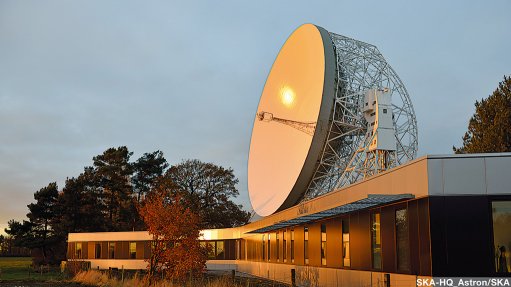
SKA South Africa (SKA SA), the agency responsible for the country’s KAT-7 and MeerKAT radio telescope arrays in the Karoo region of the Northern Cape and for the South African contribution to the international Square Kilometre Array (SKA) radio telescope project, has announced a partnership with Vox Telecom to supply “radio astronomy friendly” telecommunications services to communities lying within the Astronomical Geographic Advantage (AGA) area around the abovementioned instruments. The AGA Act was promulgated in 2007 and followed by the declaration of a core radio astronomy zone in 2010 and a wider central radio astronomy zone this year.
These zones extend roughly 500 km by 500 km and incorporate a number of small towns and some 300 farms. These all require telecommunications services, but conventional telecommunications systems can interfere with, and even damage, radio telescopes. “A radio telescope is a very sensitive radio receiver,” pointed out SKA SA site bid manager Dr Adrian Tiplady at a press conference on Tuesday. Consequently, radio frequency interference (RFI) is a major concern. “The Northern Cape is one of the best areas in the world for radio astronomy because the levels of RFI there are already very low.”
The AGA Act seeks to keep this RFI very low and, indeed, reduce what there currently is. Responsibility for protecting the AGA areas (there is also one for optical astronomy, centred on the South African Astronomical Observatory at Sutherland) is vested in the Department of Science and Technology (DST). One of the most important agencies under the DST is the National Research Foundation (NRF). SKA SA is a unit of the NRF.
This forms the background to SKA SA’s decision to issue an open tender to provide broadband connectivity within the protected zones, in a manner that would not affect the radio telescopes. Vox Telecom won. “We recognise the unique requirements for this highly sensitive area,” stated company senior product manager Jacques Visser at the press conference.
The company will supply satellite broadband services, both data and telephony, to users in the protected zones. The system will employ Very Small Aperture Terminals (better known as VSATs). It will function at frequencies above those used by the radio telescopes. The capital costs of the systems will be subsidised by SKA SA and the users will only have to pay for the use of the system.
The initial contract is for 300 installations over a two-year period. “We hope that this will be a case study for national broadband installation,” said SKA SA alternative communications and spectrum manager Selaelo Matlhane. On the farms, the system will be set up to be accessible to both the farmers and the farm workers.